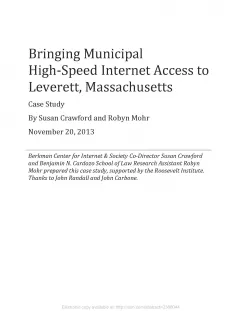
Bringing Municipal High-Speed Internet Access to Leverett, Massachusetts
From the Executive Summary:
This report provides a detailed account of the development of LeverettNet, Leverett, Massachusetts’ municipal fiber optic network. (Exhibit A is a list of interviewees.) It includes information about the extensive planning and outreach activities carried out by Leverett from 2011 through 2013, as well as details of the technical and operational characteristics of LeverettNet. Leverett has been successful in mobilizing support for LeverettNet, and the network is being built on schedule with full deployment planned for 2014. Our hope is that this report will be helpful to other cities that are considering launching fiber optic networks.
You may download this case study at: http://papers.ssrn.com/sol3/papers.cfm?abstract_id=2366044
From Prof. Susan Crawford's blogpost:
Here are our findings:
• LeverettNet is a last-mile fiber to the home network that will be operated by a publicly controlled Municipal Light Plant entity. The MLP will operate independently of Leverett’s political infrastructure, but will be required by state law to charge subscribers no more than the cost of providing service.
• The network will connect every household in Leverett. Although every residence and business will be linked to LeverettNet, individual homeowners will have the discretion to decide whether to subscribe.
• LeverettNet was planned to take advantage of MassBroadband 123, a publicly funded fiber network recently built to connect towns (but not individual homes and businesses) in Massachusetts.
• Long-term leadership, planning, and community engagement by Leverett’s public officials prompted the citizens of Leverett to approve a modest property tax increase in return for the long-term benefits of a FTTH network.
• Although LeverettNet has opted for a tiered set of access plans, had it decided to deliver 1Gbps to every home and business in Leverett the cost of service to subscribers—including Internet access and phone service, state and local taxes, access fees, network operation fees, and maintenance fees—would have been $61.30 per household per month.
